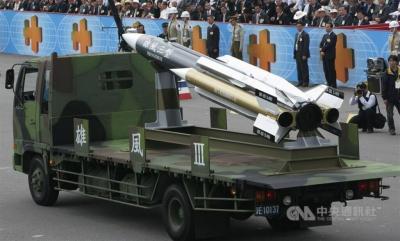A woman who sued a gynecologist and a media firm over their responses to reports that she had been fined in the Philippines over her “too small” swimwear yesterday had her case thrown out.
The Supreme Court said that reporting on the incident involving the New Taipei City woman, surnamed Lin (林), was not defamatory and was not an invasion of her privacy after police on the Philippine resort island of Boracay fined her 2,500 pesos (US$44) for “indecent exposure” due to her string bikini.
It was the final verdict after Lin appealed similar rulings handed down by two lower courts.

Photo: AFP
The Supreme Court said that the Constitution’s guarantees of freedom of speech and the public nature of the story justified reporting on the case by EBC TV as well as comments by Jeng Cherng-jye (鄭丞傑), a professor of obstetrics and gynecology at Kaohsiung Medical University.
Lin’s had sought NT$1.2 million (US$37,664) from EBC TV and NT$600,000 from Jeng.
In October 2019, Lin, who was holidaying in the Philippines with her boyfriend, was photographed on Puka Beach wearing a string bikini.
Philippine media reported that the images went viral on social media, prompting authorities to act.
Police Chief Jess Baylon described the swimwear as “literally just a string.”
Tourists should “observe proper decorum out of respect for Philippine culture,” Baylon said.
The reports were picked up in Taiwan, with media reporting information and images from Lin’s social media accounts.
Lin sued EBC, saying that it had invaded her privacy in contravention of the Personal Data Protection Act (個人資料保護法) and tarnished her reputation.
EBC also misreported Baylon’s description of her case, she told the courts.
She sued Jeng over his comments on Facebook.
Lin said that Jeng’s post, which was shared along with a photo of her in the bikini, was insulting, prejudiced and a form of sexual harassment.
She sought a public apology along with the compensation.
However, the Supreme Court backed the rulings of the district and high courts, saying that Jeng had used his experience as a gynecologist and mocking language to advise people about “adapting to changing times.”
“They were his personal views and are protected by freedom of expression,” it said.
Moreover, EBC’s reporting did not contravene the Personal Data Protection Act, as it was public discourse and the incident had been widely reported, the Supreme Court said.

STATS: Taiwan’s average life expectancy of 80.77 years was lower than that of Japan, Singapore and South Korea, but higher than in China, Malaysia and Indonesia Taiwan’s average life expectancy last year increased to 80.77 years, but was still not back to its pre-COVID-19 pandemic peak of 81.32 years in 2020, the Ministry of the Interior said yesterday. The average life expectancy last year increased the 0.54 years from 2023, the ministry said in a statement. For men and women, the average life expectancy last year was 77.42 years and 84.30 years respectively, up 0.48 years and 0.56 years from the previous year. Taiwan’s average life expectancy peaked at 81.32 years in 2020, as the nation was relatively unaffected by the pandemic that year. The metric

Taiwan High Speed Rail Corp. (THSRC) plans to ease strained capacity during peak hours by introducing new fare rules restricting passengers traveling without reserved seats in 2026, company Chairman Shih Che (史哲) said Wednesday. THSRC needs to tackle its capacity issue because there have been several occasions where passengers holding tickets with reserved seats did not make it onto their train in stations packed with individuals traveling without a reserved seat, Shih told reporters in a joint interview in Taipei. Non-reserved seats allow travelers maximum flexibility, but it has led to issues relating to quality of service and safety concerns, especially during

A magnitude 5.1 earthquake struck Chiayi County at 4:37pm today, the Central Weather Administration (CWA) said. The hypocenter was 36.3km southeast of Chiayi County Hall at a depth of 10.4km, CWA data showed. There were no immediate reports of damage resulting from the quake. The intensity of the quake, which gauges the actual effect of a seismic event, measured 4 in Chiayi County, Tainan and Kaohsiung on Taiwan's seven-tier intensity scale, the data showed. The quake had an intensity of 3 in Chiayi City and Yunlin County, while it was measured as 2 in Pingtung, Taitung, Hualien, Changhua, Nantou and Penghu counties, the data

The Supreme Court today rejected an appeal filed by former Air Force officer Shih Chun-cheng (史濬程), convicted of Chinese Communist Party (CCP) espionage, finalizing his sentence at two years and two months for contravening the National Security Act (國家安全法). His other ruling, a ten-month sentence for an additional contravention, was meanwhile overturned and sent to the Taichung branch of the High Court for retrial, the Supreme Court said today. Prosecutors have been notified as Shih is considered a flight risk. Shih was recruited by Chinese Communist Party (CCP) intelligence officials after his retirement in 2008 and appointed as a supervisor